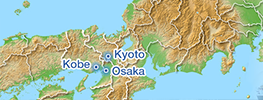
Guide to Renting Property in Kansai
Finding the right home, understanding a lease in Japan.
While any international move can be challenging, a move to Kansai often requires unique lifestyle adjustments and a reordering of one‘s priorities.
The sheer size and complexity of the city may initially seem insurmountable. However, with proper planning, most foreigners settle in comfortably and quickly, and come to appreciate the unique cultural and social opportunities this world capital affords.
The key lies in engineering a lifestyle that is convenient and rewarding for all members of the family. First steps toward achieving this are:
Choose a neighborhood that is right for you

To understand the characteristics of each area in Kansai, transportation access, commuting office or school, we recommend referring to the following pages.
Residential area guide with maps for parts of Kansai and some suburbs popular with expats.
English-written or Recommended maps for foreigners including train-route maps.
Housing Types - Furnished or Unfurnished

Furnished housing
Recommended to those who are planning to stay less than 1 year. Many options are available ranging from “weekly economical mansions” to spacious, fully-serviced executive grade apartments. “Furnished” housing generally includes basic furniture, TV, DVD and internet connections, dishes, white goods and weekly cleaning. Amenities such as front desk service, health club facilities and business centers may also be included. The rate often includes utilities such as electricity, etc.
Unfurnished Housing
Apartments
Unfurnished apartments make up the majority of available properties in Kansai. Apartments range widely from compact studio type units to large 5LDK units, low-rises and high-rises, apartments that allow pets, designer’s apartments, vintage apartments, apartments with specifications geared towards foreigners, luxurious apartments with hotel-like concierge services, apartments with earthquake proof structure, etc.
Houses
These properties range from detached houses with a garden, terrace houses, houses with a layout geared towards foreigners, houses in a gated compound, etc. Kansai or in its Suburbs; Maeda Real Estate can introduce houses that are on international school bus routes.
Rental Apartments & Houses for Long term stays
*Most rental residential properties in Japan require that renters do not wear shoes inside the property.
Understanding the Lease

Terminology
Rental
Paid monthly in advance tot the owner. A late fee may be exacted if the rent is overdue. Payment of the first and next month's rent is generally required upon initiation of the lease.
Deposit
All properties in Japan require a deposit. The size of the deposit may very from two months rent up to four to six months for expatriate grade properties. The deposit is "technically" refundable. In most cases, a portion of the deposit is deducted to pay maintenance of the property.
Key Money
Sometimes called "thank you" money. A sum generally around one to two month's rent and paid to the lessor at the initiation of the lease. It is not refundable.
Agent Fee / Commission
Industry standard provides for one=mont's rent to be paid to the real estate agent as commission.
Management (Maintenance) fee
A monthly fee for general building maintenance and , possibly to defer the cost of an on-site building manager.
Renewal fee
Money to be paid to the owner when you renew the lease contract on expiration of a lease term. The amount is in most cases equivalent to one month's rent.
Types of Lease Contracts
Normal Lease Contract (Renewable)
Usually, it is a 2 year contract. Sometimes renewal fee arises at the time of agreement renewal.
Fixed-Term Lease Contract (Not renewable)
The rental agreement terminates on the expiry date of the agreement. The agreement can be re-contracted only if both lessee and lessor agreed.
Time frame and Steps Involved in Securing a Home

You should generally begin your home search at least two weeks before your desired move-in date. It is difficult to secure a suitable property more than eight weeks before the move-in date, except when applying for a property that is currently under renovation, or the existing tenant cooperates in its showing.
You should plan on spending at least one day to view properties, and up to a week if special needs are indicated. Below is a typical schedule of events once you have located a property that interests you:
Application
Basically a document stating intent to contract a lease (Applications are not legally binding but they should not be submitted casually - let your Maeda Real Estate agent guide you in this process). Any requests related to the property must be submitted at this time and will be considered by the owner. Requests typically include minor maintenance or renovation work, the addition of various fixtures, cable or satellite TV. Once again, it is best to let your agent guide you in making these requests as negotiability varies from property to property.
Landlord's response
The time that takes for responding to your application varies by landlord. One landlord may give you an answer immediately, and the other may take about 10 days when the background check of applicants is required.
If “accepted”- move on to draft lease. If declined - continue housing search. Note: Landlords may “accept” under certain conditions, meaning the elimination or reduction of requests. Your Maeda Real Estate agent will stand in on your behalf in these negotiations.
Draft Contract
Generally prepared in Japanese. A English translation may be available depending on the landlord. A copy will be sent to your corporate HR for review, negotiation, and approval. Your real estate agent will also review the lease terms.
Final 'Original' Contract
Once all parties agree, an 'Original' contract is made. There can be no further negotiation at this stage. The original is taken to your company for execution, and all related fees become due and payable before the lease start date. Japanese landlord's will never turn over a property before receiving payment in full.
Prior to move in day
Your Maeda Real Estate agent will see that all utilities, telephone and satellite or cable services are arranged before you move in. Your agent will provide you with detailed information as to your many options and inform you of any pertinent building policies. Please be very specific about your needs in this area. Your real estate agent will also coordinate with your moving company and the building manager to see that the move is smooth and trouble free.
Move-in day
Your agent will conduct a thorough inspection of your new property and will train you in the use of all appliances and climate control systems.


